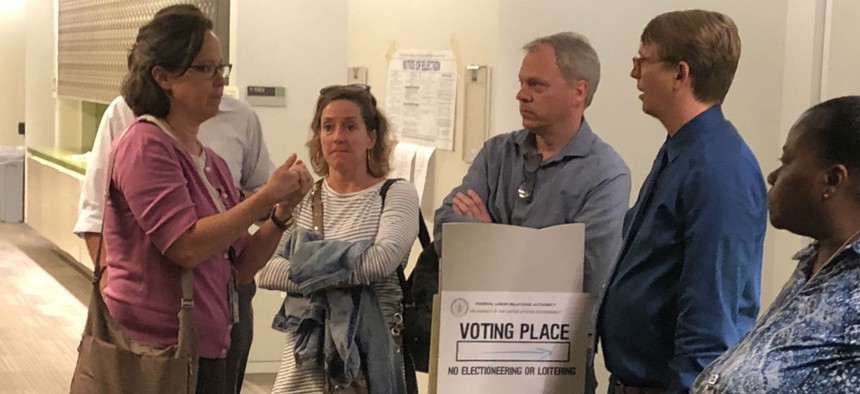
Employees of USDA's Economic Research Service await the results of a unionization vote. Charles S. Clark/GovExec.com
Agriculture’s Economic Researchers Vote to Unionize Ahead of Planned Move
AFGE successfully organizes professional and support staff in sign of resistance.
Less than a week after the Agriculture Department announced finalists among localities bidding to host relocated research offices currently based in Washington, employees at one of the offices voted to unionize.
Professional and support staff at the Economic Research Service voted 138-4 on Thursday to be represented by the American Federation of Government Employees, whose official was there to monitor the vote conducted by two officers of the Federal Labor Relations Authority.
Several dozen employees cheered the result when it was announced at ERS’s current offices in Patriots Plaza in Southwest Washington. They clapped on hearing results of a separate vote (107-9) to place professional staff and nonprofessional staff in the same union local. A total of 204 ERS employees were deemed eligible to vote by paper ballot during the three-hour slot from 11:00 a.m.-2:00 p.m.. Some 17 ballots were challenged by management, but their status is moot because by the simple majority needed for approval of unionization would not be affected.
Peter Winch, special assistant to the national vice president of AFGE, applauded the “huge turnout” for a vote that “we mean to be dramatic. Clearly the employees don’t want to move,” he added. “We looked for a good-government argument for moving, but found none. It looks like they’re trying to rip this agency apart.”
Employees at another USDA research office slated to move, the National Institute of Food and Agriculture, will hold a similar unionizing vote on June 11.
The Agriculture Department, since announcing its plans for the moves last August and soliciting bids from 136 localities now narrowed to three, has consistently defended the plan as a rigorously thought-out way to improve customer service, strengthen offices and programs, and save taxpayer dollars by moving the offices closer to stakeholders.
“We will work with this group of employees just as we work with all USDA employees,” Secretary Sonny Perdue said in a statement in response to Government Executive’s request. “I truly believe that the relocation of ERS and NIFA will help to fulfill USDA’s commitment to be the most effective, most efficient, and most customer-focused agency in the federal government, allowing us to be closer to our stakeholders and to move our resources closer to our customers. Our commitment to the public and our employees is to continue to be transparent as we proceed.”
An employee who spoke on condition of anonymity outside the voting room said that—after the expected final location is announced in June—employees will have only 30 days to make a decision on moving, and then must show up within 90 days or lose their job. Salaries would be reduced by 12%-13% under the locality pay rules, and there appears to be little time for families to visit the site, check out schools and acquire a home.
The union—with support from academics at the American Statistical Association—has blasted the moves as a “misuse of government funds and an abuse of employees’ career plans,” Winch told Government Executive. “There’s still no cost-benefit analysis,” and the department has gotten around rules that require bringing in the General Services Administration by low-balling the price of leases, he said.
Winch said he also has heard speculation that the administration wants to reduce the influence—or even privatize—some of the economic data and research done by longtime Washington-based employees with advanced degrees. Part of the plan includes transferring the ERS from its current reporting relationship with the department’s Research, Education, and Economics mission area and moving it inside the Office of the Chief Economist—part of the secretary’s office. That may be, Winch said, because ERS economists “try to influence Congress with good data” on controversial subjects like tariffs and climate change.
The department pointed out that “function areas of both agencies will remain in the National Capital Region to perform D.C.-centric activities.”
The union plans to challenge the moves in court, Winch said, and, failing that, will work with Congress to “at least delay the moves” for another fiscal year.
“The Trump administration has put ERS and NIFA researchers through the wringer and created an environment hostile to objective data collection through deep budget cuts, elimination of whole areas of work, and now physical relocation of staff,” said Rebecca Boehm, economist at the Union of Concerned Scientists, in a statement before the vote. “If we want a clean air and water, safe food and sustainable farms, USDA researchers need resources and protections from political interference to do their job well. We hope a union will help give researchers these protections.”







